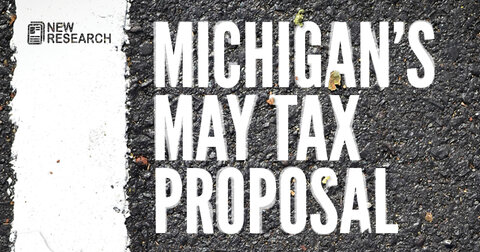Proposal 1 Will Cost Average Michigan Household Up to $525 a Year in Extra Taxes
May 5 proposal will hike taxes by $2 billion
The average household in Michigan will pay as much as $525 more in taxes in 2016 if Proposal 1 is approved by voters on May 5, according to a study by the Mackinac Center for Public Policy.
The study estimated that increasing the sales tax from 6 percent to 7 percent would cost a typical Michigan household $389 and the change in the fuel tax would cost between $88 and $136.
“Policymakers chose to fix the roads with a tax hike instead of budget cuts,” said James Hohman, the author of the study and the assistant director of fiscal policy at the Mackinac Center. “But asking for more taxes pushes budget cuts onto households that will have about $500 less if Proposal 1 is approved. Taxpayers will get something in return for higher taxes — roads will eventually be fixed, though that is only one of the spending priorities in the proposal.”
Proposal 1 is complex. It would make four changes to the Michigan Constitution and is linked to eight legislative bills that also would take effect if voters say “yes” to the constitutional changes. It would raise $2 billion, of which $1.3 billion would go to funding public roads. Another $300 million would go to public schools and $100 million would go to local government revenue sharing.
The proposal will raise the state sales tax from 6 percent to 7 percent as well as create a new and higher wholesale tax on fuel.
Gilda Jacobs, CEO of the Michigan League for Public Policy, said Proposal 1 will put more money in the pockets of low-income residents.
A single parent with two children working full time at minimum wage with an annual income of $16,626 would end up with an extra $608 a year if Proposal 1 passes, thanks to the Earned Income Tax Credit, according to the Michigan League for Public Policy.
A married couple with two children with an income of $24,939 would get an extra $465 a year and a married couple with two children with an annual income of $33,252 would take home an extra $177.
Jacobs said if Proposal 1 passes it will also fund additional public transportation. She said many low income people don’t have cars and that will allow for more buses and bus routes to help get people to work.
“There are good things in there for low-income people,” Jacobs said.
Ed Tomaszewski, who owns a business in Romeo, said it would be easier to support Proposal 1 if all the money were going to roads. He said he’s also skeptical because the state has been diverting previous tax dollars earmarked for roads to pay for things other than transportation.
“I think it is just a shell game,” Tomaszewski said. “I can’t support it.”
Leon Drolet, chair of the Michigan Taxpayers Alliance, said voters will ask a simple question: “Is my life going to get $500 better as a result of this?”
“Most people I’ve talked to don’t have faith that this will make the roads better,” Drolet said. “You are going to pay $500 and maybe get $300 for better roads or $200 for better roads because the rest of the money is being diverted. That’s a tough sell.”
Editor's note: This story has been updated with additional comments.
Michigan Capitol Confidential is the news source produced by the Mackinac Center for Public Policy. Michigan Capitol Confidential reports with a free-market news perspective.


 Whitmer changes tune on road funding
Whitmer changes tune on road funding
 Hohman: Is a tax hike coming in Michigan in 2023?
Hohman: Is a tax hike coming in Michigan in 2023?
 Fund roads through fees on miles driven, not gallons of gas purchased
Fund roads through fees on miles driven, not gallons of gas purchased